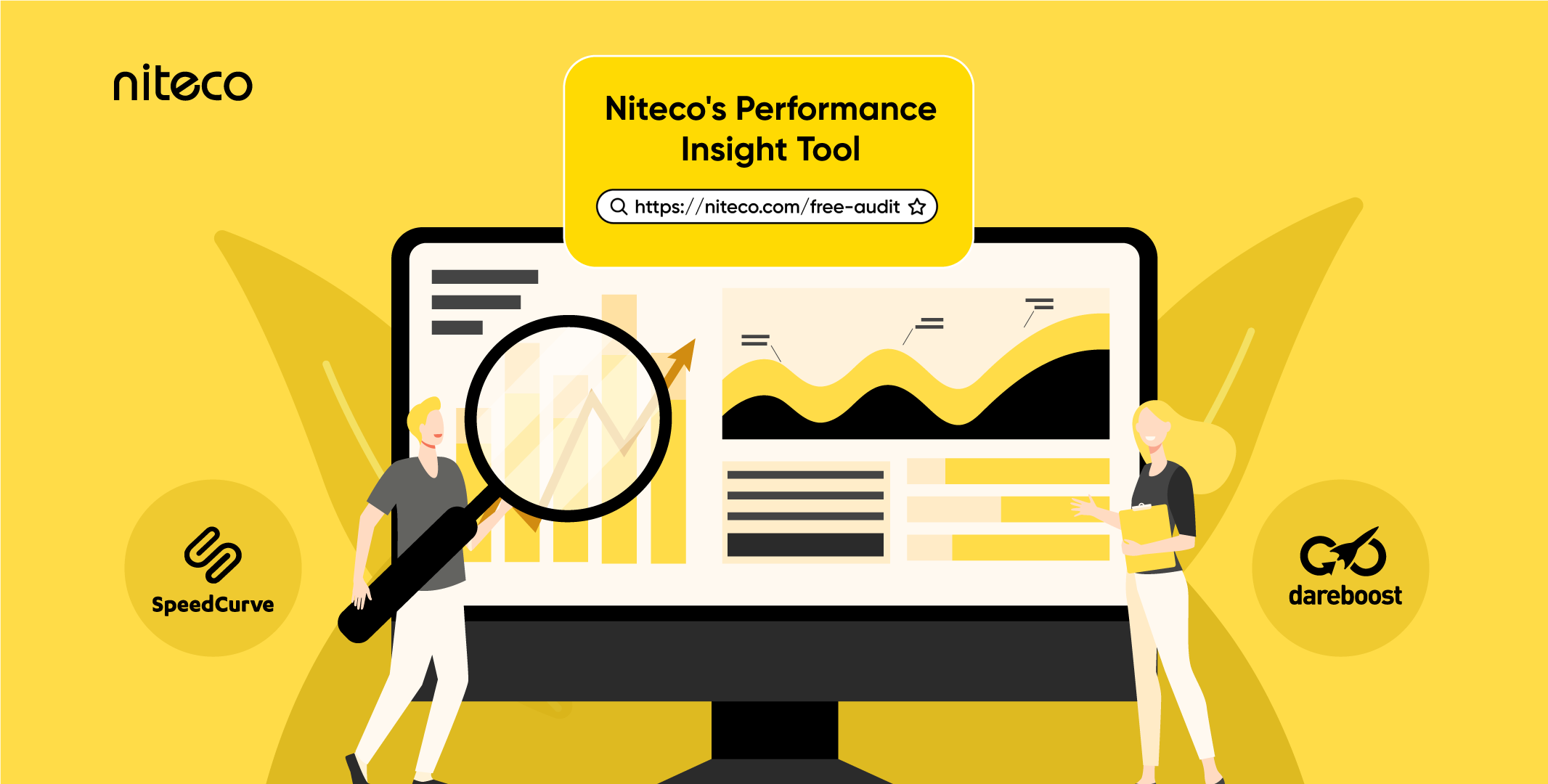With the advent of OpenAI’s advanced AI writing bot, ChatGPT, AI content has become a game-changer in digital marketing. It can research in mere seconds, thereby saving resources and significantly enhancing productivity related to content production. Now, with the launch of the latest flagship model - ChatGPT-4o, every aspect of marketing is taken to new levels. Subsequently, it’s never too late to beg the question of how to use ChatGPT for digital marketing.
Looking at ChatGPT’s capabilities and limitations, it can be used in digital marketing in the 4 primary areas: Content creation, keyword and topic research, data analysis and chatbot creation. These applications not only ensure high-quality work but also streamline processes and minimize manual tasks.
What is ChatGPT?
A great assistant to every marketer, ChatGPT has become widely known not only in workspaces but also in daily life in recent years.ChatGPT, which stands for Chat Generative Pre-trained Transformer, is an AI-powered language model that was created by OpenAI and can write text – in reply to a user’s prompts – that often reads like a human created it. While chatbots and similar AI-based models have been around for a while, it has recently jumped into the spotlight thanks to ChatGPT’s uncannily human-like responses.
The AI bot has gone certifiably viral, with people around the world having conversations with it and posting the results on various social media platforms. However, content professionals around the world quickly realized that ChatGPT and similar AI platforms have use cases that go far beyond playing around for social media clout. ChatGPT’s sheer potential for creating informative content that sounds like it was written by a human – in a fraction of the time that an actual human would need to do the same – is incredibly valuable to marketing departments that are light on resources. So, it’s no wonder that the idea of using AI to support content marketing efforts has gained traction.
ChatGPT-4o: Latest version with more capabilities
At the end of May 2024, OpenAI announced that free users can access premium ChatGPT’s features in the latest flagship model, ChatGPT-4o. GPT-4o is a model that provides GPT-4-level intelligence but is much faster and improves its capabilities across text, voice, and vision, especially data analysis and charts creations.
These features make ChatGPT a versatile tool for digital marketing, providing marketers with advanced gadgets to engage their audience, create compelling content, and uncover valuable insights from data.
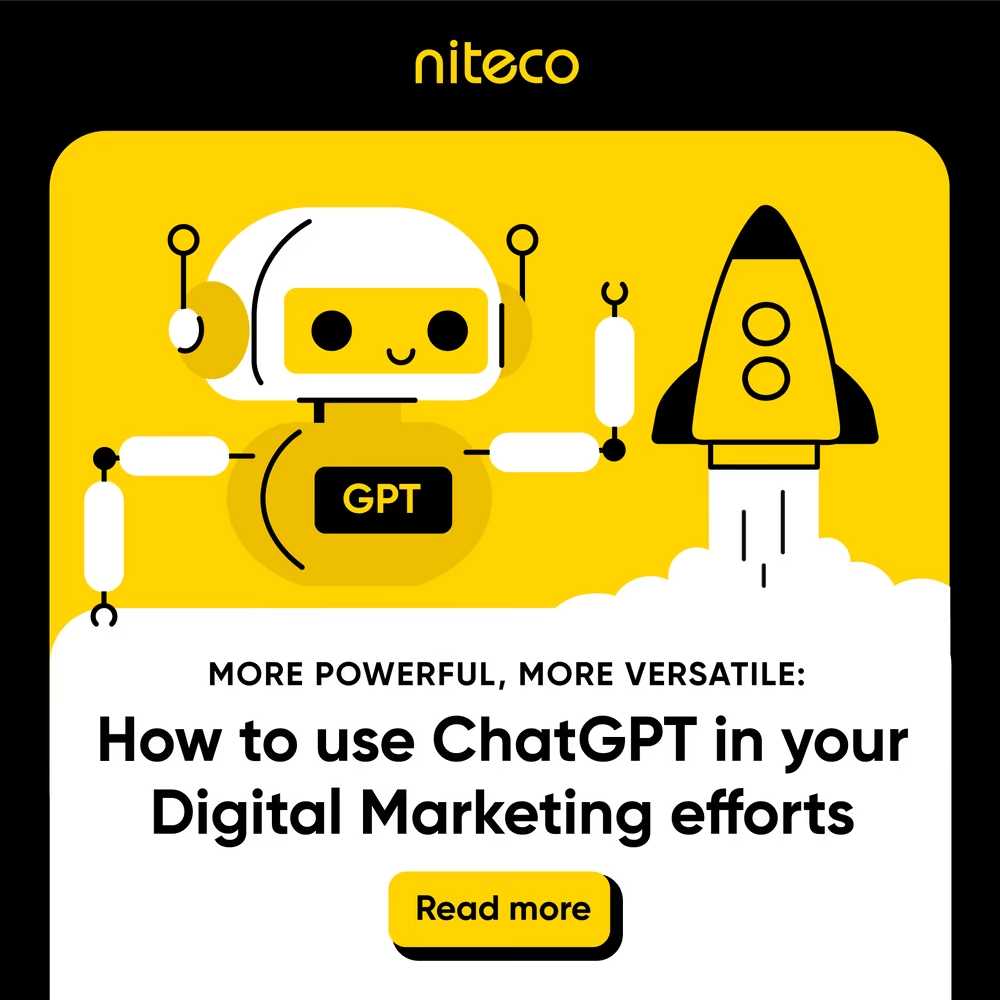
How can you use ChatGPT in your marketing efforts?
What is ChatGPT used for in digital marketing? ChatGPT can be used for a variety of daily tasks in a marketing department, with four of them most prominent: content creation, keyword research, topic research, and chatbots.
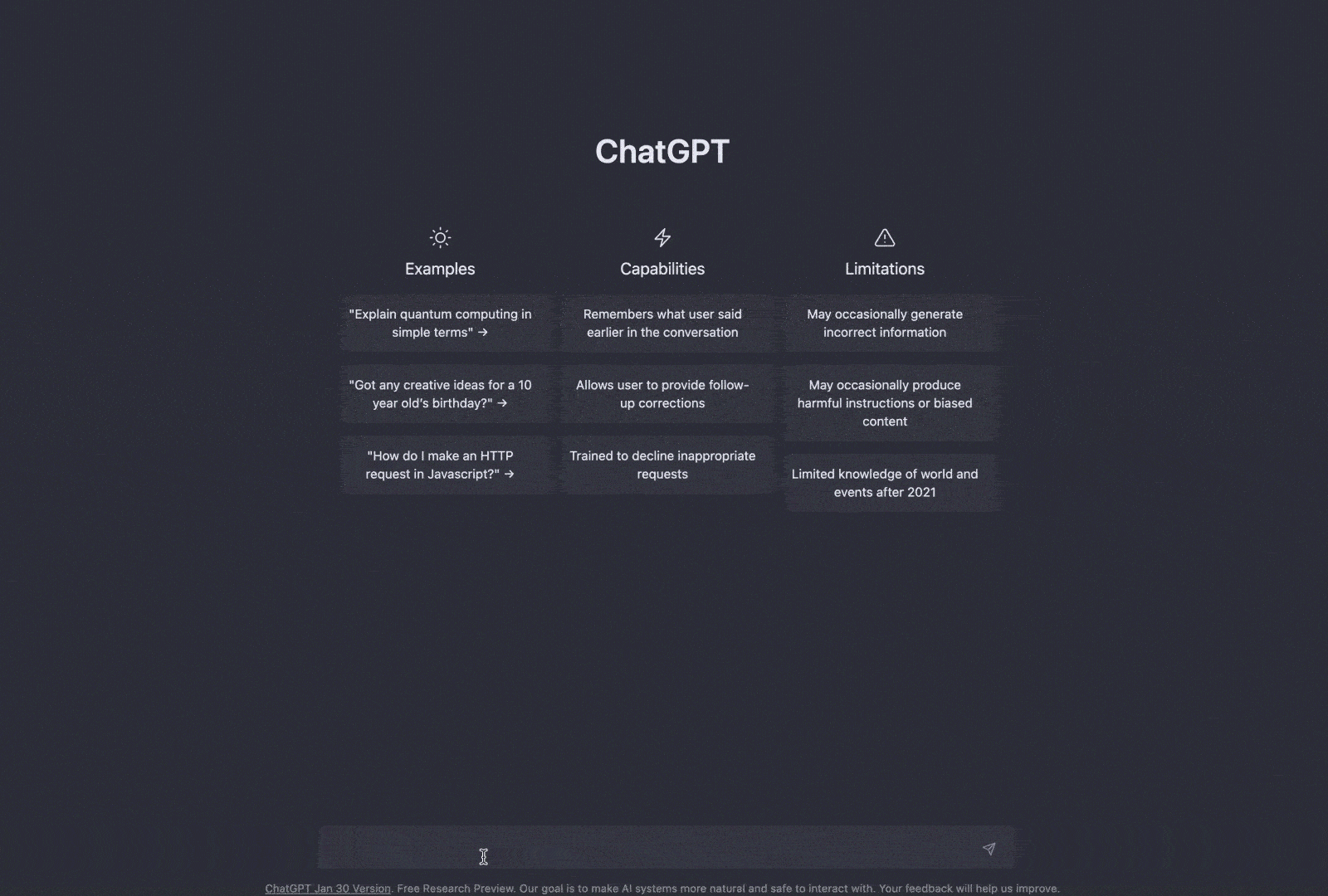
How can ChatGPT help with content creation?
Let’s have ChatGPT answer this question in its own words first:

It’s clear that creating content is one of ChatGPT’s greatest strengths. It does it quickly and uses sources all around the internet to collect the information in the text it generates. For sheer speed of the process, from prompt through research all the way to the finished text, a human simply cannot keep up. That means that marketing departments that are short on resources or time could definitely use ChatGPT to generate at least some of the content they use.
Content that ChatGPT or similar bots can easily handle by themselves is meta title and description for SEO (Search Engine Optimization) purposes, diverse types of content such as social media captions, product descriptions, ad copy, or UX/UI copy.
If you’re going to use ChatGPT to generate content for you, we strongly recommend a human editor being involved in any case to ensure natural language processing and appropriate tone of voice. Not only will this help you avoid linguistic issues, there are also other drawbacks to using ChatGPT in content creation that you need to keep in mind. More on that below.
Keyword and topic research with ChatGPT
How can ChatGPT help you with SEO? Using the right keywords is essential for any SEO effort, so keyword research is extremely important. However, it can also be time-consuming. ChatGPT can considerably shorten the time needed for effective keyword research by quickly generating a list of potential keywords.

The user simply needs to give the bot a prompt, in this case the general topic for which you want to do the research. You then ask ChatGPT to provide you with a list of SEO keywords for said topic. Within seconds, it will return a list of usually 10 keywords for you to use. What ChatGPT can’t do is give you additional information like search volume since it doesn’t have access to any real-time sources. That means you still have to do some manual work evaluating the keywords it has given you.
But what if you're out of ideas entirely? In that case, you can ask ChatGPT for recommended topics within a certain field. The bot excels at summarizing information, so by asking a few questions about your area of interest, you can receive highly informative and concise briefs in seconds. While this won't give you a complete picture, it will provide condensed information much faster than a Google search or Wikipedia dive.
For content marketers, a short conversation with ChatGPT can kickstart a content creation process on a new topic and even help in the creation of SEO briefs. While further research always has to occur using other sources, it can be invaluable as a starting-off point. However, you always need to keep in mind that ChatGPT may sometimes refer to information that is out of date or wrong, so always make sure to confirm the information it gives you.
Incidentally, keyword and topic research are some of the 9 most effective ways to drive organic traffic to your website.
Data analysis with ChatGPT
ChatGPT-4o, the latest flagship model from OpenAI, can also suggest data-driven insights that help boost your digital marketing efforts. It uses Python code to scan through your data files, assists with data-oriented tasks such as grouping, cleaning large datasets, and uncovering insights.
Furthermore, ChatGPT-4o supports the creation of a wide range of charts, including bar graphs, line graphs, pie charts, dual-axis line graphs, scatter plots, and more. These tools empower users to identify trends, patterns, and correlations within their data, thereby facilitating the extraction of meaningful insights.
Leveraging advanced machine learning techniques, ChatGPT-4o can analyze large volumes of data quickly and accurately, providing marketers with real-time insights.
By integrating these capabilities, ChatGPT-4o streamlines the data analysis process. This allows marketers to concentrate on strategic decision-making and optimizing their digital marketing efforts.
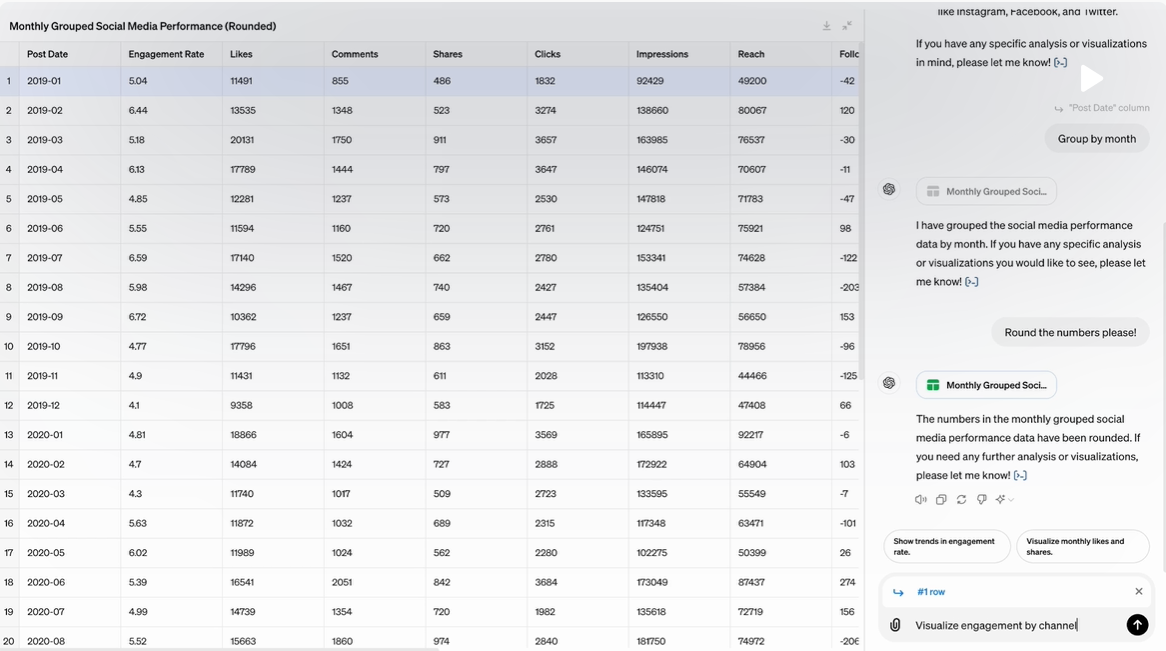
Source: OpenAI
Making chatbots with ChatGPT
One of the best use cases for ChatGPT in companies with a customer support focus is the creation of chatbots. These bots simulate conversations with customers to help them with issues they may have without requiring the time and effort of your employees. With ChatGPT’s ability to generate human-like responses, its suitability for this specific use case is obvious.
While using ChatGPT as the underlying AI model for your chatbot is a great start, the most important part of setting up a successful chatbot is training. It needs documents specific to your business and the task you want it to perform so it can then generate appropriate responses based on these documents. You also need to keep training it with specific prompts and replies to make it as useful to your users as possible.
Also keep in mind that the specific steps and tools you need to use to create a chatbot with ChatGPT may differ depending on the platform you use.

What are the pitfalls of using ChatGPT in marketing?
Accuracy issues with ChatGPT
The biggest caveat for the use of ChatGPT is that the information it provides is not always correct. There are several reasons for this. For one, the model was trained on data that is not completely up to date, which means that the information it can access concerning newer developments in the world is limited or nonexistent. If you consider how much has happened over the past few years, this is a major drawback for anyone looking for up-to-date information on any given topic.
Another reason is that it’s possible to intentionally feed ChatGPT incorrect information. While this is likely quite rare, it’s by no means a minor issue. In the end, this means that ChatGPT can’t be used as a completely reliable source. You always need to verify the information using additional sources. Since ChatGPT also doesn’t tell you where it sourced the information it is presenting you, verification isn’t as straightforward as it is in a regular online search.
SEO issues with ChatGPT
While Google said in the past that any AI-generated content would be penalized, this seems to no longer be the case, as SEO.ai writes. In its Search Essentials, Google now says that it is only “spammy” automatically generated content that will be penalized in the search rankings. In essence, it defines such content as having been generated solely for search engines and not for humans. This means that editing AI-generated content has become more important than ever.
When you’re working with AI-generated content, it’s crucial that you still keep the user experience in mind instead of only focusing on keywords and rankings. Generative Engine Optimization (GEO) is one example of how generative AI is powering hyper-personalized web experiences across borders. With Google now stepping into the AI ring itself with the release of Google Bard, it will also be interesting to see how Google’s own guidelines for AI-generated content will evolve in the future.
Creativity and ChatGPT
As ChatGPT itself readily points out when prompted, it’s great at quickly creating content of decent quality, but it lacks the creativity and the unique perspective a human writer can bring to a topic. At the end of the day, the AI model can only create content based on the data on which it was trained, so anything it creates is inevitably derivative. And while it isn’t always necessary to reinvent the wheel when it comes to engaging users and ranking highly in search results, it’s important to be creative in order to stay relevant in a competitive field.
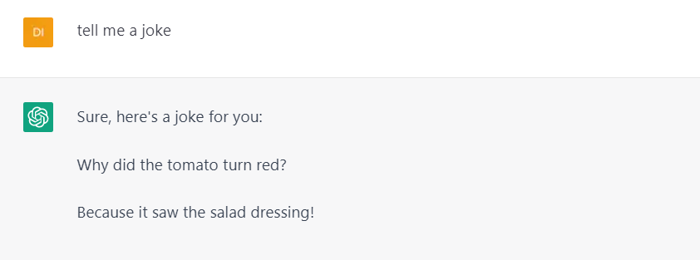
While some users try to coax more creativity out of ChatGPT – with one example drawing scathing criticism from famed musician Nick Cave – this is clearly not what the model was designed to do. It is meant to create content that is informative and condenses information, not words with deeper meaning or artistic merit.
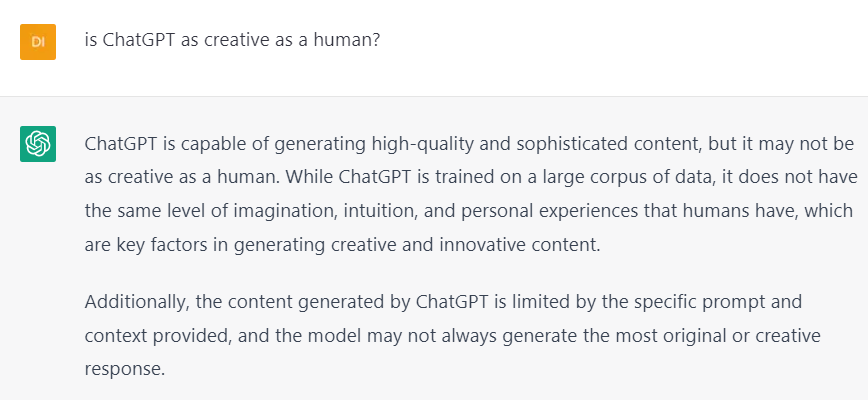
Copyright infringement and ChatGPT
Another significant pitfall of ChatGPT is the potential for copyright infringement. This issue has been highlighted in recent reports by The New York Times, which has sued OpenAI and Microsoft for allegedly using their articles without permission or payment to train ChatGPT and other services.
This raises an important concern for digital marketers using ChatGPT to produce content. If the content generated by ChatGPT is found to infringe on copyrights, marketers could potentially face legal risks. They could be held liable for using and distributing copyrighted content without permission, which could lead to legal proceedings and financial penalties.
Best practices when using ChatGPT in digital marketing
Beware of the limitations
You already know the pitfalls of ChatGPT. They can not only hinder your marketing effectiveness but also negatively affect your business and brand, leading to disengaged customers.
Remember, ChatGPT is just a machine, pulling information from millions of documents that may sometimes be outdated or misleading. So you will have to be the one to do a final check and quality control of the AI-generated content.
Train ChatGPT on your own data
The more you train ChatGPT with specific prompts, the deeper and more relevant its responses will be.
ChatGPT doesn't inherently understand your unique needs and context. If you ask it short questions without sufficient context, it will generate generic answers. These generic responses may not be suitable for your marketing needs.
The key is to make ChatGPT work like your personal assistant, who understands your specific context to provide the answers you need.
Write effective GPT prompts
To get answers tailored to your specific concerns, you need to craft effective prompts. An effective prompt provides ChatGPT with the necessary information. While there's no fixed formula for a perfect prompt, we recommend adding as many elements as possible to enhance the responses’ quality.
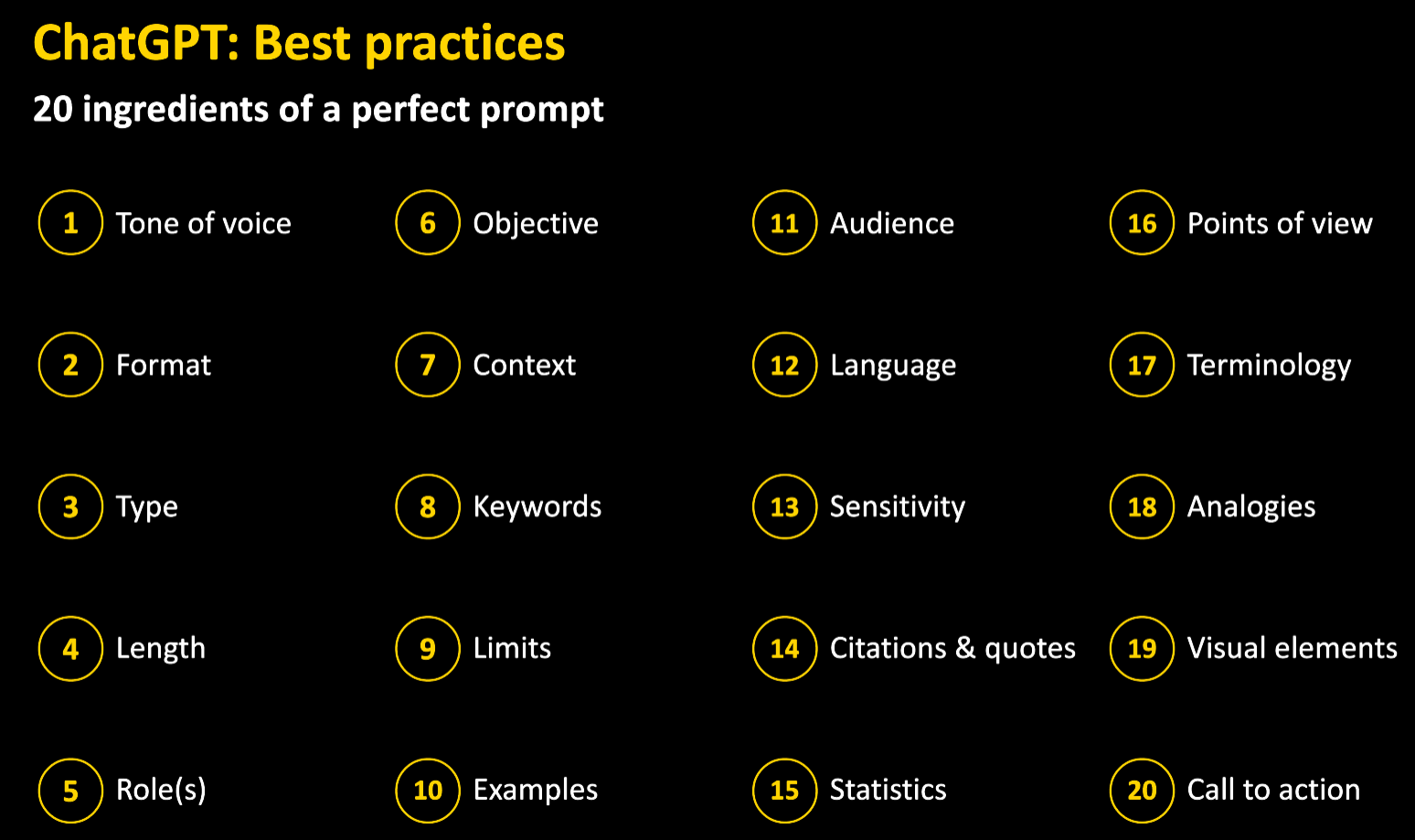
What is the value of ChatGPT in Marketing?
Overall, ChatGPT and its continuous improvements are making our lives easier. Leveraging AI capabilities to help with research and SEO, chatbots as well as for analyzing data and creating charts will lead to an increase in efficiency.
However, let’s make one thing clear first: AI isn’t going anywhere. The cat is out of the box and won’t go back in. That being said, it is up to marketers to use ChatGPT and all the other bots that will inevitably follow responsibly. Leveraging these AI capabilities to help with research and SEO as well as for powering chatbots that help users will lead to an increase in efficiency and saved time for marketers that can be invested into other tasks. The most important aspect, however, is the continuous involvement and oversight by actual humans, making sure that the results produced by the AI provide value to the end user.
The same goes for actual content creation. While, as we mentioned, Google and likely other search engines won’t rank content lower just for being created by AI, such content should always be edited by human editors to make sure it meets the users’ standards.
One thing to keep in mind is that as AI-produced content proliferates, fully human-created content will be able to stand out more to readers thanks to the creativity and viewpoints involved. That means that content creators are not going to go anywhere either. They simply need to adapt and learn how to create content that an AI can’t come up with.
Do you want to know more about the use of AI in your digital marketing and how Niteco can help you achieve your business goals? Contact us today!
to transform your business and drive results?


